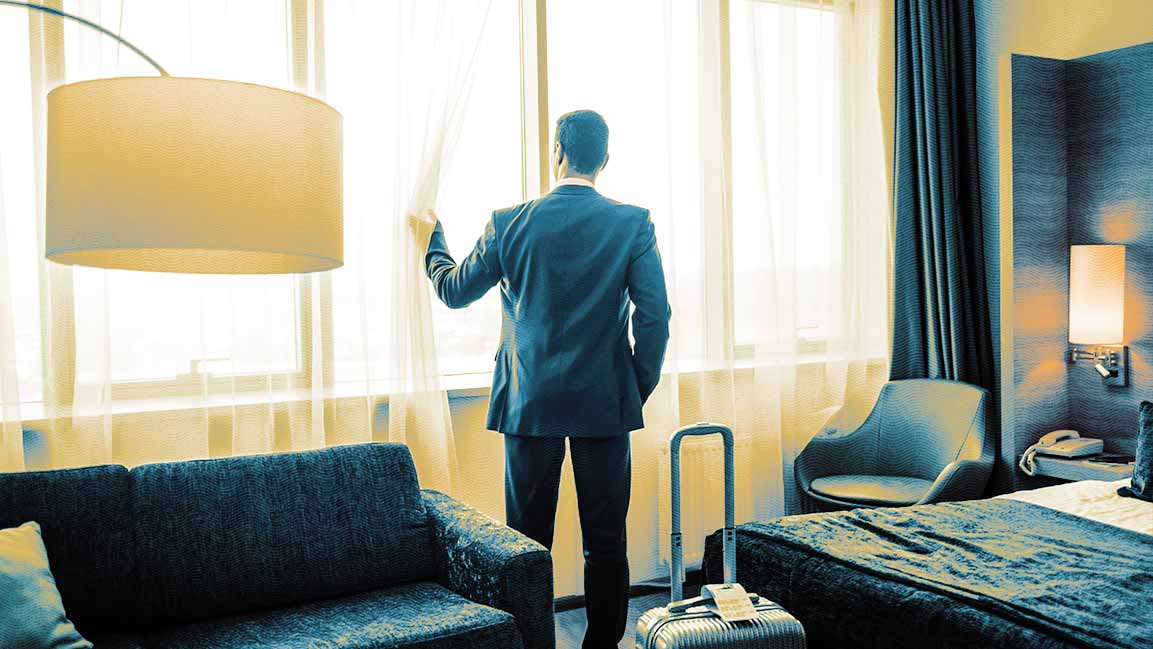- | 9:00 am
No ordinary guest: Hotels in the Middle East are eyeing bleisure travelers
The mix of business and leisure travel is transforming the hospitality industry in the region

The next time you check into a luxury hotel, you may notice that the vibe feels slightly different.
Along with enticing spa packages and seasonal restaurant menus, you’ll likely be told about the stylish new co-working space, high-tech boardroom, and even in-room hydraulic tables that convert to standing desks with outlets and USB ports.
As technology blurs the boundaries between work and play, professional and personal, in the world of hospitality, there’s a new breed of guests – the growing army of leisure travelers.
Finding their feet shortly after the pandemic, what’s interesting about the “bleisure” (business with leisure) demographic is that they defy easy pigeonholing.
They could be an employee of a big organization who is required to shuttle across the globe for tradeshows. They could be a digital nomad tapping out a client pitch on a beach in Sharm El Sheikh – or perhaps a CEO checking their emails on a ski lift in the mountains of Lebanon. In Dubai, you might find them calling suppliers for their e-commerce site in a funky café before heading to Dibba for a weekend of snorkeling.
They all carry laptops and at least one smartphone and believe firmly in work-life balance. That’s why they break the routine of business trips to explore new destinations, experience diverse cultures, and try exotic cuisines.
TRANSFORMING HOSPITALITY INDUSTRY
Conrad Gallagher, CEO of Food Concepts 360 and a Michelin-star chef, says the mix of business and leisure travel is transforming the hospitality industry across the GCC.
“If you’ve got skin in the game, you’ll want to cater to their needs,” he says. “Many hotels now offer premium dining options throughout the day, extend dining hours to accommodate late arrivals, and enhance concierge services to arrange bespoke local experiences and facilitate smooth transitions between work and leisure activities. It’s all about creating that trendy experiential stay.”
Mohamed Samir El Sayed, Group Chief Executive Officer of Maxim Investment Group, an Egypt-based investment company specializing in hospitality, believes the rise of leisure is driven partly by millennials’ increased spending power.
“This generation fills high-paid positions that involve business travel,” he says. “These travelers are tech savvy, love personalized experiences, and are very wellness-focused. If hoteliers can fill all those needs, they will win a huge market share of this valuable segment.”
ENJOY TIME ON THE MOVE
The stats back this up – 78% of millennials have purposefully carved out personal time during a business trip, according to a survey by Chase Marriott Rewards.
Of course, leisure isn’t limited solely to this generation. Research by travel analysts CWT has shown that Gen X employees, those 36-54 years old, are the second largest leisure travel group. CWT also found that female business travelers are likelier to take leisure trips than their male counterparts.
Whoever they are as individuals, the bleisure traveler is geographically literate, often owns a business or does high-level consultancy, is comfortable dipping in and out of time zones, has the cash to splash, and wants to enjoy their time on the move.
At the Vogo Abu Dhabi Golf Resort (previously The Westin), the hotel has completely reinvented the guest experience to cater to the growing bleisure market, says Luke Sacco, Resort GM of Vogo Hotels UAE.
“Solo business travelers often seek to connect with like-minded individuals, and golf provides a perfect setting. Our championship floodlit golf course encourages corporate guests to engage in informal networking and build meaningful relationships. Most corporates arrive as strangers, join other executives on a four-ball, and leave as friends, enhancing their networking experience. During peak business travel season from September to April, 45% of our occupancy comprises corporate golfers.”
ON-DEMAND SERVICES
According to Aloki Batra, CEO of FIVE Hospitality, which has properties in the UAE on Palm Jumeirah and Jumeirah Village, the formula for ensuring a happy leisure guest is convenience, on-demand services, and accessibility.
“We meet the needs of modern remote workers and traveling executives in various ways – from flexible check-in and check-out times to accommodate varied schedules to upgraded amenities such as 24-hour in-room dining, laundry, and comprehensive concierge services,” he says.
“Business needs are also being met with ergonomic workspaces, high-speed Internet and strong Wi-Fi, and fully equipped meeting rooms – while for those on extended stays.”
According to a Global Business Travel Association report, more than one in three business travelers worldwide are now adding a leisure component to their work trips. A Euromonitor forecast anticipates the leisure segment will more than double between 2021 and 2027.
The hospitality industry is transforming its spaces into productive work environments. Notably, it has embraced the co-working space trend, inspired by companies like WeWork, to cater to guests who want to be productive during their stay.
These offer conference calls, meetings, presentations, document creation, and printing facilities. Many include amenities like tea, coffee, snacks, and meals, as well as face-to-face and video conferencing options.
Rob Mortimer, Managing Director of Fuelre4m, a Dubai-headquartered company with offices in South America, Europe, and the Far East, spends most of his time traveling and working on the go and looking for hotels that make the experience efficient and pleasurable.
“The most important things are fast check-in, responsiveness to changed plans – as every trip will need some on-the-fly tailoring – a practical workspace in the room with good lighting for those constant Teams calls, and where practical, access to a business center for unplanned meetings,” he says.







































